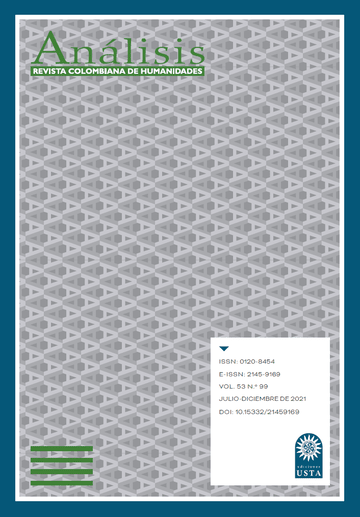La fábula invertida o sobre la amoralidad de la fábula —a propósito de la fábula como herramienta de interpretación antropológica—
Abstract (en)
Usually the fable is understood as that literary genre in which there are characters (mainly animals) who, not being humans, behave as if they were, however; in this paper we will try to show it is possible that in such stories the animals are not the ones humanized, but the human is the one who is bestialized, and that this perspective will enable us to understand the fable as an anthropological interpretation tool.
Abstract (es)
Usualmente se entiende la fábula como aquella narración en el cual hay personajes (principalmente animales) que, no siendo humanos, se comportan como si lo fueran; sin embargo, en este trabajo se intentará mostrar que es posible que en dichos relatos no sean los animales los que se humanizan, sino el humano quien se bestializa, y que dicha perspectiva nos permitirá entender la fábula como una herramienta de interpretación antropológica.
References
Cárdenas, G. (2014). Palabras endemoniadas para ángeles sin talento. Impresora Feriva.
Cárdenas, G. (2018). La filosofía como práctica cultural educativa. Revista Práxis,
Educación y Pedagogía, (1), 160-175.
https://praxiseducacionpedagogia.univalle.edu.co/index.php/praxis_educacion/ar
ticle/view/6470/8661
Cárdenas, G. (2019). Crítica Pedagógica y Antropopedagogía: Hacia una nueva
problematización del Estado. Revista Práxis, Educación y Pedagogía, (3), 136-157.
https://praxiseducacionpedagogia.univalle.edu.co/index.php/praxis_educacion/ar
ticle/view/8675/11850
Deleuze, G. y Guattari, F. (1985). El anti-Edipo, capitalismo y esquizofrenia. Editorial
Paidós.
Freud, S. (2005). Tótem y tabú. Editorial Skla.
Grimberg, C. (1984). Historia universal: el alba de la civilización. Círculo de Lectores.
Hobsbawm, E. (1998). La era del capital. Editorial Crítica.
Monterroso, A. (2005). La oveja negra y demás fábulas. Santillana Ediciones Generales.
Pinkola, C (2005). Mujeres que corren con los lobos. Ediciones B.
Ricoeur, P. (1990). Freud: una interpretación de la cultura. Siglo XXI editores
Montaner Bueno, A. (2013). Análisis del tratamiento de la fábula desde una perspectiva
intercultural. Esopo y la tradición española en las aulas de sexto curso de
Educación Primaria. Revista de la Facultad de Educación de Albacete, (28), 183-
Wittgenstein, L. (2010). Tractatus Logico-Philosophicus. Alianza Editorial
How to Cite
License
Authors who publish with this journal agree to the following terms:
Authors retain copyright and grant the journal right of first publication with the work simultaneously licensed under a Creative Commons Attribution License that allows others to share the work with an acknowledgement of the work's authorship and initial publication in this journal.
Authors are able to enter into separate, additional contractual arrangements for the non-exclusive distribution of the journal's published version of the work (e.g., post it to an institutional repository or publish it in a book), with an acknowledgement of its initial publication in this journal.
Authors are permitted and encouraged to post their work online (e.g., in institutional repositories or on their website) prior to and during the submission process, as it can lead to productive exchanges, as well as earlier and greater citation of published work (See The Effect of Open Access).






